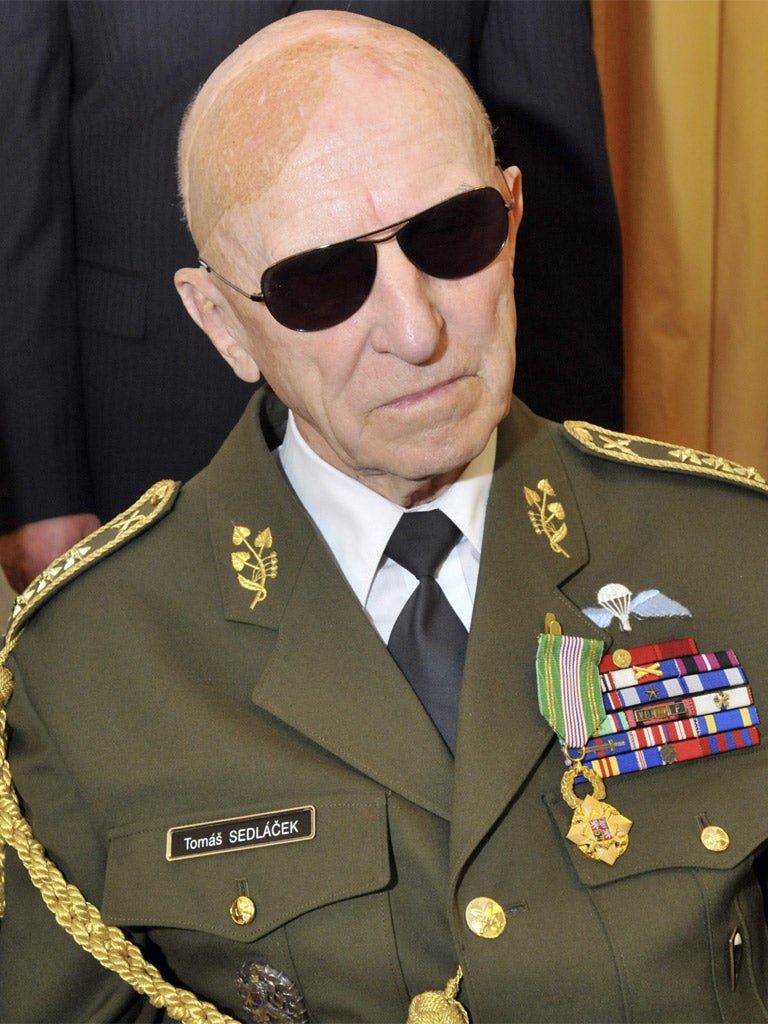Tomas Sedlacek: General who fell foul of Stalinism

Tomas Sedlacek was a Czech patriot, army officer – and a victim of Stalinism. He was born in Vienna, the youngest of four children of a military officer. It was a dramatic time. The Austro-Hungary Empire was breaking up; the dream of Czech nationalists was being realised with the setting up of the Czechoslovak Republic. Sedlacek grew up imbued with a deep sense of loyalty to the new state. The Czech President Vaclav Klaus praised him as "a true soldier".
After school he joined the army and after a course for officers was enrolled at the traditional military academy in Hranice, Moravia. In 1938, Lieutenant Sedlacek was put in charge of an artillery battery. Although mobilisation followed German demands, not a shot was fired. The Munich Agreement of September 1938, which deprived the republic of its frontier fortifications, was followed by the German occupation in March 1939. The armed forces were disbanded and Sedlacek was assigned to the weights and measures office in the small town of Jilemnice.
In 1940 Sedlacek left by the Balkan route (through Slovakia, Hungary, Yugoslavia, Greece, Turkey and Beirut) to France. At the Foreign Legion base at Adge in southern France, he joined other Czechs in the 1st Czech Division. After the fall of France he was evacuated to Britain, where he joined around 3,000 Czechs and Slovaks at Cholmondeley Castle near Chester.
He participated in a number of military courses, including parachute training. Perhaps impatient for action, he volunteered for transfer with 40 other officers to the Russian front in August 1944. There he became a member of the second Czechoslovak airborne brigade, fighting in the Carpathian mountains and later being dropped into Slovakia to help the national rising there. This lasted from August to October 1944 and although unsuccessful, it was one of the most significant revolts in Nazi-occupied Europe.
After Czechoslovakia was liberated in May 1945, Sedlacek was promoted to major and graduated from the Military Academy in Prague. He lectured at the military academy in Hranice, then in the summer of 1948 he was promoted to head of the operational department of the 11th Infantry Division in Pilsen. The following year he was appointed to the staff of the Military Institute in Prague. This was possibly a position which gave him too much prominence.
The Communist putsch of February 1948 changed the situation dramatically. As in the rest of the Soviet bloc , the Communists quickly established a so-called people's democracy. Purges of "unreliable elements" started soon after. Those who had served in Britain were particularly vulnerable, and Sedlacek was arrested in February 1951. He was tortured and forced to sign a confession. A show trial followed for alleged treason and espionage. Convicted, he was lucky to avoid the death penalty.
He was one of around 100,000 political prisoners; part of his imprisonment was served in the notorious Pibram uranium mines in the heart of Bohemia, where uranium was extracted largely to feed the Soviet Union's nuclear weapons programme. There, thousands of regime opponents were incarcerated; as well as military officers, they included scientists, artists, clergy, politicians, athletes and the national ice hockey team (world champions in 1947 and 1949). Sedlacek and other heroes of the anti-Nazi resistance also had to work alongside war criminals, members of the Nazi apparatus, and collaborators. Many died in the camps.
Released in 1960, Sedlacek, banned from any professional activity, worked as a warehouseman. The Prague Spring of 1968 came and went; new purges followed but Sedlacek, by then a 50-year-old worker, was overlooked in the scramble to round up the new generation of those who wanted "Socialism with a human face".
The Velvet Revolution in 1989 led to his rehabilitation. Despite losing his sight Sedlacek remained optimistic and continued to take part in public life. But he must have been disappointed to live to see the break-up, peaceful though it was, of Czechoslovakia in 1992. He served as chairman of the Audit Committee of the Confederation of Political Prisoners and of the Czechoslovak Legionaries and was on the Central Rehabilitation Commission. In 1999 he was promoted to lieutenant-general, and in 2008 to the highest military rank of the Republic, army general.
David Childs
Tomas Sedlacek, soldier: born Vienna 8 January 1918; died Prague 27 August 2012.
Join our commenting forum
Join thought-provoking conversations, follow other Independent readers and see their replies
Comments
Bookmark popover
Removed from bookmarks